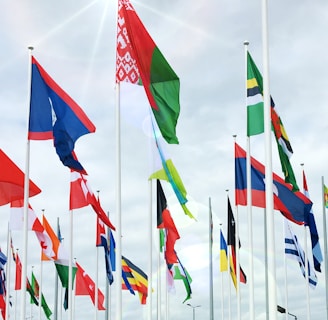Bridging Borders, Boosting Business: How Language Translation Fuels Global Expansion
Bridge cultures and boost your bottom line. Discover how strategic language translation is the key to unlocking global business expansion and success.
MARKETINGSUCCESSBILINGUALEXPANSIONBUSINESSCULTUREECOMMERCEMACHINE TRANSLATIONLINGUISTICLANGUAGESMULTILINGUALTRANSLATIONTRANSLATORGLOBAL
8/5/20253 min read


Bridging Borders, Boosting Business: How Language Translation Fuels Global Expansion
In today's interconnected world, the phrase "the world is your oyster" has never been more literal for businesses. The digital age has shattered geographical barriers, offering companies unprecedented access to a global marketplace. However, a significant chasm remains – the language barrier. While a product or service might be universally appealing, the ability to communicate its value effectively to a diverse audience is what truly unlocks global success. This is where language translation, once considered a mere logistical necessity, emerges as a strategic powerhouse, driving global business expansion in profound and transformative ways.
At its core, language translation is about more than just converting words from one language to another. It's about cultural adaptation, brand resonance, and building trust. Imagine a meticulously crafted marketing campaign that resonates deeply with an English-speaking audience. A simple, literal translation into Japanese, Spanish, or Arabic might miss the cultural nuances, humor, or emotional triggers that made the original so effective. A professional translation goes beyond words; it localizes the message, ensuring it speaks directly to the heart and mind of the target consumer. This localization is not an afterthought; it is the cornerstone of building a global brand identity that is both consistent and culturally sensitive.
One of the most immediate impacts of effective translation is the expansion of a company's customer base. By translating websites, e-commerce platforms, and product descriptions, businesses can instantly open their doors to millions of new potential customers who prefer to browse and buy in their native language. Studies consistently show that consumers are far more likely to make a purchase when product information and reviews are available in their own language. This isn't just about convenience; it's about building confidence and reducing friction in the buying process. When a customer can fully understand the features, benefits, and support options of a product, they feel more secure in their decision, leading to higher conversion rates and a significant boost in sales.
Beyond the initial sale, translation is crucial for long-term customer relationships and retention. Think about customer support. Providing support in a customer's native language can be a game-changer. It transforms a potentially frustrating experience into a positive one, fostering loyalty and trust. This is particularly vital for technical products or services where clear communication is paramount. A well-translated knowledge base, user manual, or FAQ section can empower customers to solve their own problems, reducing the burden on support teams and improving overall customer satisfaction.
Moreover, language translation is a critical component of successful B2B expansion. When entering a new international market, businesses need to communicate with partners, distributors, and regulators. This requires more than just marketing materials; it demands the translation of legal documents, contracts, patents, and technical specifications. Precision and accuracy in these translations are non-negotiable, as even a small error could lead to costly misunderstandings or legal complications. Professional translation services, often with specialized subject matter expertise, are essential to navigate these complexities and build a solid foundation for international partnerships.
The advent of machine translation has made translation more accessible than ever, but it's important to understand its limitations. While useful for getting the gist of a text, machine translation often lacks the context, cultural sensitivity, and nuance required for professional communication. Relying solely on machine translation for critical business materials can damage a brand's credibility and lead to embarrassing errors. The most successful global companies use a hybrid approach, leveraging machine translation for high-volume, low-stakes content and investing in professional human translation for their core marketing, legal, and brand communications.
In conclusion, language translation is no longer a peripheral function; it is a central pillar of any successful global expansion strategy. By breaking down language barriers, businesses can unlock new markets, build stronger customer relationships, and establish themselves as trusted global brands. From localizing marketing campaigns and e-commerce platforms to translating legal documents and customer support materials, every translated word is an investment in a company's international future. In the global marketplace, the ability to speak the language of your customer is not just a competitive advantage—it's a fundamental requirement for success. For businesses with global ambitions, the question is not whether to translate, but how strategically and effectively to do it.
Translations
Expert translations for businesses and individuals worldwide.
© 2024. All rights reserved.
